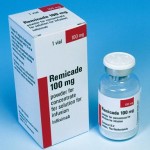 Remicade is a drug that helps patients alleviate symptoms caused from rheumatoid arthritis, ankylosing spondylitits, psoriatic arthritis, psoriasis, Chron’s disease, or ulcerative colitis.
Remicade is a drug that helps patients alleviate symptoms caused from rheumatoid arthritis, ankylosing spondylitits, psoriatic arthritis, psoriasis, Chron’s disease, or ulcerative colitis.
Remicade blocks the action of a protein in the body called tumor necrosis factor-alpha (TNF-alpha). TNF-Alpha is made by the body’s immune system.
People with certain diseases have too much TNF- alpha that can cause the immune system to attack healthy parts of the body. Remicade can block the damage cause by TNF-alpha
How Remicade Works
Remicade is given by injection. The dosage is fully based on the medical condition, weight, and response to treatment of the patient.
After the first dose is administered, the medication is usually given again after two weeks and 6 weeks, then every 8 weeks.
Remicade may also be self-injected, however the patient must learn all the preparation and usage directions from his/her health care professional.
Cheaper Versions of Remicade
Although the Remicade treatment is expensive, there might be a cheaper version out there.
Recently, Celltrion Inc and Hospira Inc, two companies that focus on the development of biosimilar products, have received backing by the European Medicines Agency to produce similar versions of the drug Remicade.
The medicines, called Remsima and Inflectra, are recommended to be used for Rheumatoid arthritis, ankylosing spondylitits, psoriatic arthritis, psoriasis, Chron’s disease, or ulcerative colitis.
Remsima and Inflectra are noted to be cheaper than Remicade by 30 percent.
However, Johnson & Johnson, the developers of Remicade, has patent protection in most of Europe through February 2015 and in the United States until September 2018.
Johnson & Johnson could also use patent infringement lawsuits to block or slow the approval of Remsima and Inflectra.
